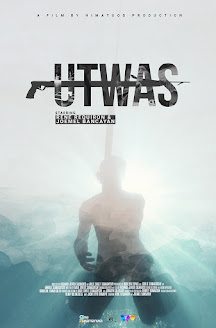August 9, 2020
The Cinemalaya had adapted to the current physical distancing protocols brought about by the Covid-19 pandemic by bringing this year's film festival online for streaming on Vimeo. The films in competition were all short films only this year, 10 of them in all. While there was no competition for full-length films. there are also several past Cinemalaya feature films in its retrospective selection available for streaming.
Disclosure: I am not really a fan of short films. In all the previous film festivals I have attended and reviewed, I always prioritized feature films only. Because there were only short films competing in this festival, it then follows that I will be reviewing short films -- for the very first time since I began reviewing movies. This art form is new to me so my criteria for their appreciation are still in development. Here are my reviews of the 10 short films in competition:
SET A
ANG GASGAS NA PLAKA NI LOLO BERT ("The Broken Vinyl Record")
Directed by Janina Gacosta and Cheska Marfori
Written by Janina Gacosta
Lonely retired music teacher Bert lived in an old stone house by himself. One day, a package was left at his doorstep, containing old photograph of an old friend and a scratched up vinyl record of a kundiman which would skip when played. He went to a record shop owned by an old widower named Miyo to have it fixed.
The story may be very simple, but the film had a bittersweet yet charming throwback feel to it. This nostalgia was further evoked by its faded color palette, aside from that unmistakable sound quality of the vinyl records that serve as its musical score. The winsome portrayal of Soliman Cruz as Miyo convincingly tamed the curmudgeonly Bert, as portrayed of ever-reliable Dido de la Paz. 7/10
PABASA KAN PASYON ("Chanting the Passion")
Directed and Written by Hubert Tibi
It was Holy Week in an Albay town. The elderly mother was a singer of the traditional "pasyon," and her middle-aged son acted as her manager. When the son played Herod in their Passion Play, the mother prepared his costume and makeup. Meanwhile the radio station where the son worked as an announcer closed shop as it could not compete with FB and Spotify.
This film was shot in elegant black and white, with the Mayon Volcano regally in the background. The mournful soundtrack was composed of traditional pasyon chants and heavy strings music. The relationship of son and his mother was poignantly portrayed by the actors, Buboy Aguay and Isabel Pedrasa Bogoc. That final scene was heartbreaking in its implications. 7/10
FATIGUEDDirected and Written by James Mayo
It called itself an interactive film where participation is important. You are an exhausted employee who had overslept from sheer fatigue. You sleepwalk through a dimly-lit underground pedestrian tunnel. You exit your room, go downstairs, meet your dog and end up in your room again. You follow the voice of mother (Yayo Aguila) telling you to wake up.
This was a truly bizarre experimental film, and I appreciated it especially on second viewing. From the beginning, an atmosphere of horror was created with creepy images and musical score. This film was crafted in a way that we need to keep our eyes on the screen, to read the printed words in order understand what was going on. However, the whole nightmare effect was ruined by an unfortunate typographical error in the final frame. 6/10.
TOKWIFI ("Star")Directed and Written by Carla Pulido Ocampo
A grandfather of an Igorot tribe was telling the story of how a young man named Limmayug (Kurt "Aye-eo"Lumbag Alalag) saw a fiery star falling to the ground. At the site where it landed, he found a working television set. An actress from the 1950s, Laura Blancaflor (Adrienne Vergara) was on, and she engaged the clueless Limmayug in conversation.
Shot in the picturesque Cordillera mountains among the Igorots of Bontoc, this had a deep mystical feel to it. This was unexpectedly juxtaposed with classic Filipino cinema with mentions of director Manuel (Conde?) and producer Dona Sisang. This was a quaint little film with a strange story and weird sense of humor, but it certainly had memorable impact because of its uniqueness, especially with that endearing ending. 7/10
QUING LALAM NING ALDO ("Under the Sun")Directed and Written by Reeden Fajardo
Middle-aged transgender sampaguita farmer Budang (Jeff "Budang" Gando) learned that his son Janjan was coming back home after working in Canada for several years. So she and his partner Georgia (Lucas "Plyka" Dungca) go to market to get the kitchen ready for his homecoming party.
This Kapampangan short film started with some appetizing close-up scenes of cooking a tasty-looking stew, which set a warm homespun mood. However, the corny jokes and awkward acting of Plyka almost tank the whole thing from the first few minutes. But fortunately, Budang came across as sincere, and, along with its reunion theme, these aspects certainly gave the film its effective heartwarming moments. 5/10
SET B
ANG PAGPAKALMA SA UNOS ("To Calm the Pig Inside") Directed and Written by Joanna Vasquez Arong
This was a documentary in the Bisaya language with a female narrator (Anna Rong) bitterly reminiscing about the time when super- typhoon Yolanda wreaked her destructive power in Tacloban City. She talked about devastating deadly storm surge and compared it to a "buwa" or the pig underground during an earthquake.
The film consisted of video footage and a slideshow of haunting still photos and children's drawings about the storm. It has been seven years since Yolanda and Tacloban has somehow risen from the disaster already by now. But even then, looking back on these images and footage can still trigger chills and tears. 6/10
LIVING THINGS
Directed and Written by Martika Ramirez Escobar
Kints (Kristine Kintana) and Charles (Charles Aaron Salazar) are a young live-in couple. They tend to be quite immature as they decide about who took out the garbage by having a staring contest or spend a lengthy amount of time discussing about their favorite things. Suddenly one day, Charles turned into a life-size cardboard cutout of himself.
This was as strange and perplexing as any plot twist can get. I am not really sure what becoming a cardboard standee was supposed to mean. Was it to represent how couple who had spent a long time together would want their partners to stay a certain way together? We waited for the ending to make sense of the whole thing, but alas, its interpretation was also wide open puzzle. 4/10
UTWAS ("Arise")Directed by Richard Salvadico and Arlie Sumagaysay
Written by Arlie Sweet Sumagaysay
This Hiligaynon film followed fisherman (Rene Requiron) as he trained his apprentice son Toto (Joemel Bancayan) the ins and outs, and tricks of their trade. Within his training of skills and knowledge, there were also very pointed commentary about various issues about the ocean, like dynamite fishing and pollution with plastic waste.
The cinematography was very impressive with great shots of the restless ocean above and below. The sound work too was quite remarkable as the sound and music shifted from clear to muffled as the camera goes from surface to under the water. Among all the films, this was the one that felt most real. This was also the only one with the most compelling ending sequence. 8/10
EXCUSE ME, MISS, MISS, MISSDirected by Sonny Calvento
Written by Arden Rod Condez
Vangie (Phyllis Grande) was a contractual salesgirl at the Trendysitas Shopping Mall. Supervisor Miss Charo (Angelina Kanapi) told Vangie that she was not going to be regularized because she was slacking on the job. It was only then that Vangie discovered Miss Charo's secret for being so untiring and energetic.
The oddball sense of humor of this short began with its opening song based on jingle of a popular chain of malls.The special visual effects were remarkably clean and topnotch for an indie short. It was saying that it was virtually impossible to gain work-life balance as a contractual worker, but the ending was a head-scratcher for me. In another one of her quirky characters, Kanapi again steals the show here. 6/10
THE SLUMSDirected and Written by Jan Andrei Cobey
A poor family of five living in a Tondo slum were chosen by a TV show to be interviewed about their lives. The father Julio (DMs Boongaling) and mother Nayda (Sunshine Teodoro) welcomed the crew into their home. Gay teenage middle child and Catriona Gray fan Oliver (Dylan Ray Talon) was most thrilled about his 15 minutes of fame. Youngest child Boy (Kenken Nuyad) was just being his cheerful playful self. However, the eldest Pamela (Jorrybell Agoto) was getting suspicious of the show's motives.
Of all the entries, this wacky comedy should be the most accessible and most entertaining for mainstream viewers. The scene of Nadya's interview when she was stymied by a question about her weight was a memorable one. Sure, some lame jokes don't fly, but everybody can definitely identify with being very foolish and excited to be seen on TV. 7/10.









































